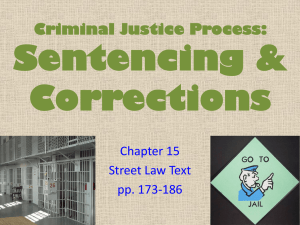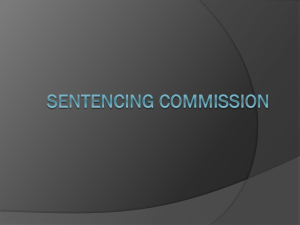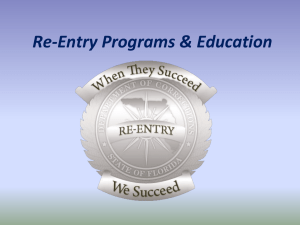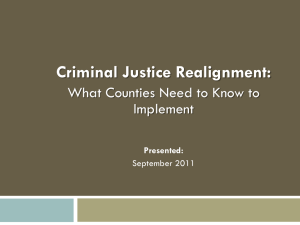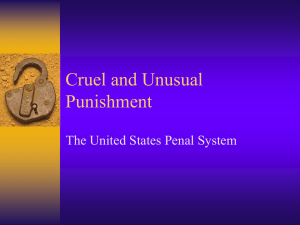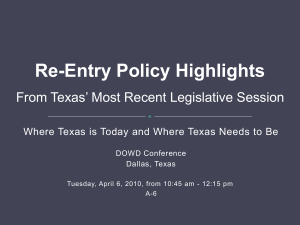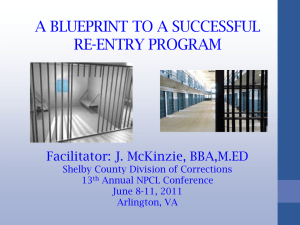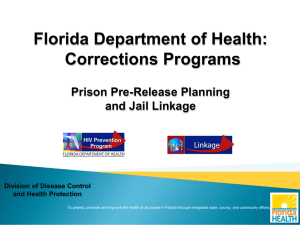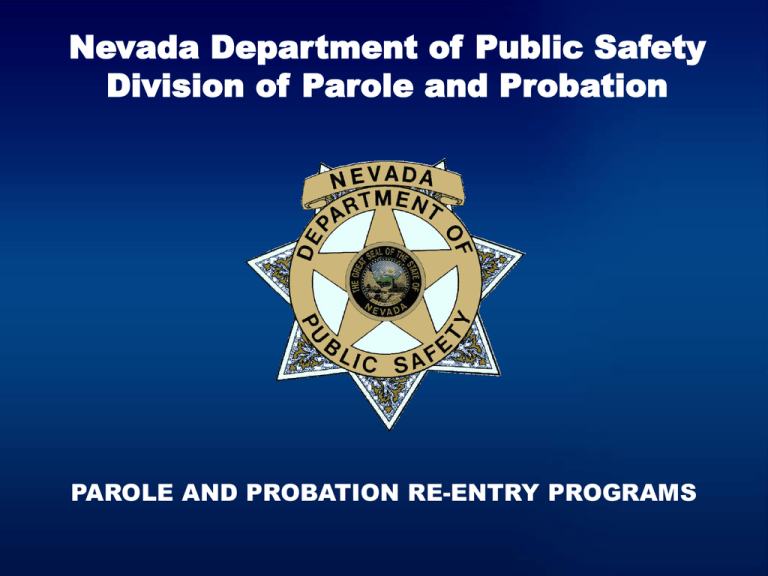
Nevada Department of Public Safety
Division of Parole and Probation
PAROLE AND PROBATION RE-ENTRY PROGRAMS
Agency Collaboration
Beginning in December 2012 and into 2013, Division of
Parole and Probation, Nevada Department of
Corrections and Nevada Board of Parole
Commissioners personnel jointly attended training
conducted by the National Institute of Corrections on
“Systems Approach to Organizational Performance”.
Agency Collaboration
This training resulted in a collaborative effort to
improve re-entry services for the parolee population
in Nevada.
Numerous post-training planning sessions were held
and our current services are the result of that planning
and implementation.
Pre-Release Unit
Personnel:
DPS Lieutenant (1)
DPS Sergeant (1)
Parole and Probation Specialist III (1)
Parole and probation Specialist II (10)
Las Vegas Personnel
Parole Unit:
DPS Lieutenant
DPS Sergeants (2)
DPS Officers (10)
Specialist III (1)
Administrative Assistant IV (2)
Offender Supervision
The Parole Unit is responsible for the supervision of
offenders who have been granted release from prison
by the Parole Board of Commissions and have a
viable placement plan.
Offenders are supervised by the Division while they
complete a term of community supervision under their
rules of parole.
Supervision of offenders is granted to the Division of
Parole and Probation under NRS Chapters 176, 176A,
209 and 213.
Statistical Data
On average the Division of Parole & Probation
receives approximately 350 approved parole grants
from the Board of Parole Commissioners each month.
Of those, approximately 300 inmates are released on
parole each month, leaving approximately 50
inmates who have been approved for release, but
were not released for various reasons.
Parole Grant Approved – Not Released
For the month of May 2014, the Division of Parole and
Probation, Pre Release Unit recorded 357 inmates as
“approved” for an upcoming parole release to
community supervision.
In contrast to this number, 321 inmates could not be
released from prison despite having current parole
grants.
Of the 321 inmates not released from the custody of
NDOC to parole supervision, the following slides
provides the reasons the inmates were not released.
Statistical Data
Inmates Eligible for Parole not Released
Non-viable Plans
Refused to Parole
Ineligible due to holds
Delayed Release Plan
Pending Investigations
Parole Grant not received in time
Awaiting Approved Funding
Awaiting Acceptance Letters
Interstate Compact Investigations
Sex Offender Complications
Variety of Reasons
Statistical Data
Approximately 26.2% of offenders approved for
parole refuse or refused to submit a parole plan;
Approximately 18.7% submitted a non-viable plan, or
their plan was denied during the investigation;
Approximately 6% were waiting for the investigation
of their plan to be completed;
Approximately 15.9% did not receive their parole
grant in time to complete release process prior to
parole eligibility date.
Approximately 1.5% were waiting on acceptance
letters to parole to a residential program;
Statistical Data
Approximately 4.7% were ineligible for release due to
a detainer being in place from another jurisdiction;
Approximately 4.7% were not released due to a
pending investigation by another state as the inmate
has requested to transfer their parole to another state.
Approximately 6.5% were delayed because they
were awaiting a release plan;
Approximately 8.2% had an approved plan, but were
awaiting on approved funding.
Approximately 3.1% encountered placement
complications due to their sex offender status.
Approximately 4.5% fell into a variety of
complications category.
Approved Parole Grants
Once received by the Board of Parole Commissioners,
the approved parole grants are entered into the
Division’s Offender Tracking Information System (OTIS)
by our support staff.
Upon entry, a criminal history records check is run on
every offender to determine if there are any valid
warrants and/or detainers.
If a warrant is found and a detainer is placed on an
inmate from another jurisdiction, the inmate will still be
paroled, but their release will be delayed pending the
resolution of the warrant or detainer by the other
jurisdiction.
Approved Parole Grants
If there are no warrants or detainers, the approved
parole grants will be assigned to a P&P Specialist who
will determine if the offender falls under certain
immediate release criteria.
For instance, if an inmate has no history of violence or
convictions for a sex offense, they can parole to an
approved halfway house facility without a field
investigation being completed.
If the inmate does not meet this criterion due to the
offender’s criminal history, the P&P Specialist will
forward the approved parole grant to the appropriate
Parole & Probation field office for an investigation by a
sworn officer.
Pre-Parole Investigation
The investigation conducted by the assigned sworn
officer will include verification of the residence, the
suitability of the occupants and the location, if
applicable.
It will also include verification of employment, or
verification of placement into a counseling program if
required by the Board of Parole Commissioners as a
condition of parole.
Investigation Completion
Upon completion of the investigation by the sworn
officer, the P&P Specialist will coordinate and process
the release of the inmate with the Release
Coordinator at the Nevada Department of Corrections
(NDOC).
If the placement is denied, the P&P Specialist will work
with the NDOC caseworker, Division Re-Entry
Coordinators and the inmate to obtain another viable
plan.
Pre-Release Responsibilities Cont.
The Pre-Release unit is also responsible for the
tracking of approximately 1,775 institutional parole
cases and 200 institutional probation cases.
These cases involve an inmate with multiple parole
and/or probation cases where the underlying prison
sentences are consecutive to each other. In these
situations an inmate may be approved for a parole
grant on one case, but will then begin serving their
sentence on a second or subsequent case, therefore,
they will not physically be released from custody
even though they have been granted parole on the
first case.
Pre-Release Responsibilities Cont.
The Pre-Release unit will continue to monitor and track
these types of cases until either the inmate is eligible
for release on all of their cases, or a specific case is
discharged, whereupon the P&P Specialist will process
the appropriate discharge paperwork and the inmate
will be discharged on that particular case.
Re-Entry Program
Re-Entry Coordinators are responsible for working with
inmates who have been approved for parole, but are
still incarcerated past their parole eligibly date due to
difficulty in obtaining adequate funding and/or
difficulty in obtaining viable placement in the
community.
Re-Entry Coordinators are the liaisons between
inmates and the Nevada Department of Corrections
(NDOC), the halfway houses, the treatment programs,
the Veterans Affairs programs, the Nevada Re-Entry
Coalition and the Incarcerated Veterans
Reintegration Council.
Re-Entry Coordinators
Re-Entry Coordinators visit prison facilities on a regular
basis to meet with inmates one on one to develop
suitable residence plans for release on parole.
Re-Entry Coordinators will contact halfway houses
and treatment programs in regards to accepting the
inmate into their program and assist them to fill out
application requests;
Re-Entry Coordinators
Re-Entry Coordinators will contact perspective
employers in an attempt to obtain employment for
inmates.
Conduct group inmate meetings in the prison to
educate the inmates on various residence plans,
interstate compact issues, and Veterans
Administration (VA) programs.
Available Funding
The inmate will also be notified about any indigent
funding that may be available and they are provided
with the Parole & Probation approved facility list that
can help them find suitable halfway houses willing
and able to accept them. Also specific education on
sex offender specific residences, halfway houses and
treatment programs are relayed to any inmate with a
conviction for a sex offense.
Veteran Inmates
Re-Entry Coordinators work with the Veterans
Administration program and assists veterans currently
incarcerated in prison.
Re-Entry Coordinators assists veteran inmates fill out
various forms necessary to enroll them in a VA
program if not already approved.
Coordination with NDOC
Lastly, Division Re-Entry Coordinators and the Re-Entry
staff at NDOC meet on a regular basis and work with
other state agencies.
They discuss available resources to help place
inmates into approved state licensed programs and
to specifically help any mentally ill inmates with their
release plans.
Las Vegas
Inmate Transition to Parole Procedures
Since October 2013, Re-Entry Coordinators from the
Division of Parole and Probation, Southern Command
have participated in a joint effort with various Nevada
Department of Corrections facilities in Southern
Nevada to assist a parolee’s transition from a life of
incarceration to a successful life out of custody.
Southern Command Re-Entry Coordinators have been
conducting orientation programs and informational
seminars at the women’s and men’s prisons, as well as
prison work camp sites.
Las Vegas
Inmate Transition to Parole Procedures
Re-Entry Coordinators will conduct an orientation and
informational seminar at the Florence McClure
Correctional Center located in North Las Vegas.
Re-Entry Coordinators will conduct orientations and
informational seminars at the Southern Desert
Correctional Center, Three Lakes Conservation Camp
and High Desert Correctional Center. These facilities
are located at Indian Springs, located approximately
40 miles from Las Vegas.
This orientations and informational seminars occur
monthly within each facility.
Parole Eligibility Orientation (LV)
During these sessions, the inmates are provided an
orientation of the pre-release process. The PreRelease plan is discussed as well as the importance of
supplying caseworkers with two solid release plans.
Re-Entry Coordinators also discuss the option of
declining to parole, as appropriate.
Parole Eligibility Orientation (LV)
The inmates are then walked through the release
process from the time they are released from the
prison and delivered to the parole and probation
office to the time they are released from parole.
A sample parole agreement and all the rules of
parole are reviewed and the most common special
conditions are discussed.
Parole Eligibility Orientation (LV)
Re-Entry Coordinators review the good time credit
process and what is required of parolees to keep their
original Parole expiration dates.
The parolees are also instructed as to their
requirements if they are paroled to a hold.
Parole Eligibility Orientation (LV)
Re-Entry Coordinators discuss other important topics
with inmates such as the Interstate Compact process
for inmates desiring to parole to another state.
The Parole Unit’s philosophical approach to
supervision of parolees along with detailed behavioral
expectations and what is required from them in order
to successfully complete parole.
Orientation (Las Vegas)
What happens when they encounter law
enforcement.
Re-Entry Coordinators discuss how Division detainers
are placed on offenders. These detainers are placed
when offenders are involved in new criminal activity
and/or violate their supervision conditions.
The procedure for requesting a travel pass and when
inmates are eligible to apply for a travel pass.
Social Service and
Personal Development Programs (LV)
Re-Entry Coordinators provide an overview of reentry, social service and personal development
programs such as:
Hope for Prisoners
The Foundation for Independent Tomorrow (F.I.T.) and
Urban League
One Stop Shop
Shade Tree Women’s shelter
Department of Veteran’s Affairs
Las Vegas Urban League
Westcare
Services Provided by Programs (LV)
These programs offer services for:
Pre-Vocational Training
Mentoring
Leadership Training
Job Development
Basic Computer Training and Skills Development
Housing and Rental Assistance
Substance Abuse Counseling Services as well as many other
services designed to assist the parolee with the daunting task
of obtaining the assistance needed to comply with the terms
of parole as well as becoming an asset to the community as
a whole.
Question and Answer Opportunities (LV)
Finally, a review of the information shared with
inmates is completed.
Inmates are provided a list of the most common
counseling programs available in the Las Vegas.
During closing and wrap up of the orientation
program, the room is opened to the inmates for
question and answer time.
Offenders without
Appropriate Release Plans (LV)
Additionally, in an effort to assist offenders who could
not secure appropriate release plans, the Parole Unit
voluntarily researched local residential complexes
that would be willing to accept parolees as residents.
That research led to an agreement with an extended
stay residential complex with multiple locations
throughout the state who agreed to accept those
troubled inmates.
Offenders without Appropriate Release Plans
Additionally, this company (Siegel Suites) has now
become a vendor with the Nevada Department of
Corrections, which allows for the company to be paid
directly by the Nevada Department of Corrections
and for the inmate to be released to these residences
upon his or her parole grant.
Program Response and Effectiveness
Upon completion of the orientation/information seminars
many parolees have been thankful for the information
provided and were less anxious upon release having
received the information provided at the seminars.
This response serves as proof that our concerted efforts are
paying off. By being able to centralize operations and
deal with the inmates directly, once paroled, these
offenders are equipped with the knowledge they need in
order to get off to a good start.
By working directly with the inmates who are not released
during the month for whatever reason, the Division’s ReEntry Coordinator has been able to get an average of 25
inmates per month released to a viable placement plan
who would have otherwise remained incarcerated.
Questions?

